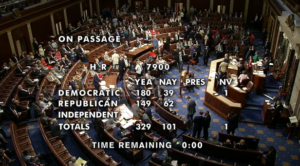
The House on Thursday evening passed its nearly $840 billion version of the fiscal year 2023 National Defense Authorization Act with a bipartisan 329 to 101 vote. Lawmakers advanced the bill after two days of floor debate and consideration of 650 amendments, a new record, to include adopting an increase to the number of F-35Cs authorized in the bill and measures requiring the Navy to report on long-term contracting strategies. “[That’s] a record we weren’t necessarily looking to set but…

 By
By 











